If you’ve been in the market for a new car, driven around a public parking lot or just turned on the news lately, you’ve come across electric vehicles left and right. EV sales have grown steadily in the United States over the past decade, yet they still comprise a minuscule percentage of the total automotive market share. But that may begin to change in a big way in 2022.
There are a number of reasons EV ownership could become more mainstream next year, but the most notable one may be the emergence of electrified trucks. The three most popular vehicles in America are pickup trucks. In 2022, we’ll see several EV pickups enter the market. There will also be more SUV and crossover EV options, in line with America’s growing preference for larger vehicles.
With that said, let’s get to the fun stuff. Here are just a few of the 2022 electric vehicles to get excited about.
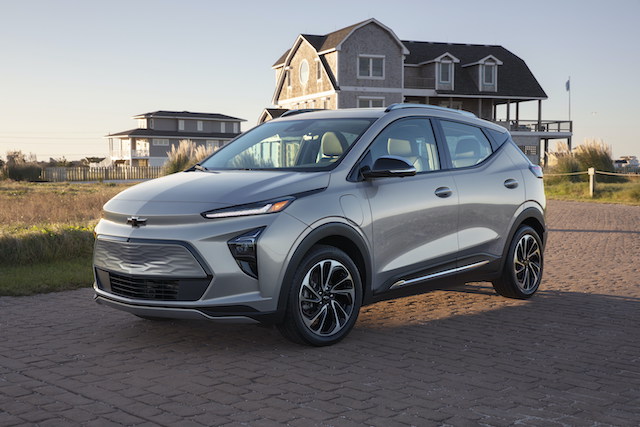
Chevrolet Bolt
The Chevrolet Bolt has long been one of the most popular EVs in the country. Expect that trend to continue as the hatchback has been newly redesigned for 2022. More notably, it’s being joined by the brand-new Bolt EUV, a compact SUV. Mechanically similar, the Bolt EUV offers the creature comforts of a larger model, including more cabin space and higher ground clearance. The crossover is also the first Chevrolet model to come with Super Cruise, parent company General Motor’s partially automated driving system.
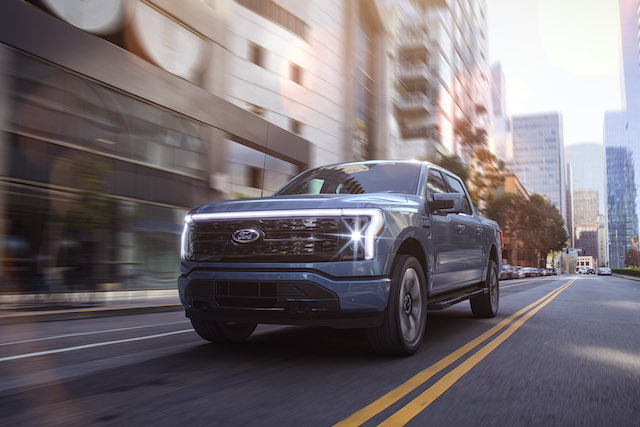
Ford F-150 Lightning
The gas-powered Ford F-150 has been the best-selling vehicle in America for more than 40 years. As such, electrifying the truck could have a profound effect on the American driving public and has led many to refer to the Lightning as the most important EV ever.
Those concerned the electric F-150 sacrifices power for clean driving need not worry. The Lighting boasts 563 horsepower and 775 pound-feet of torque. All this with a 230-300 mile range and a starting price below $40,000.
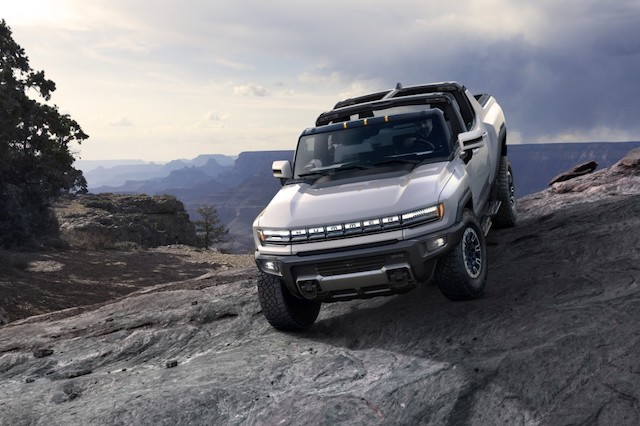
GMC Hummer EV Pickup
It’s hard to imagine the once gas-guzzling Hummer being on a list of eco-friendly vehicles. But times, they are a-changin’. And indeed, the Hummer as we used to know it has changed quite a bit. Formerly its own brand, the Hummer EV is now a GM model. Although it has none of the gas-powered engines, it has all of the horsepower. Three electric motors combine to deliver 1,000 hp. That’s enough to get you from 0 to 60 mph in three seconds. And let’s talk about the crab walk. This unique feature uses four-wheel steering to allow the vehicle to move diagonally. And did we mention the roof comes off?
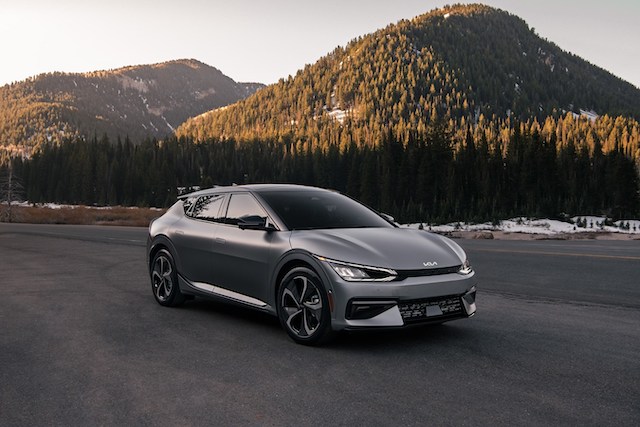
Kia EV6
With wheels pushed to the farthest edges of the car, the Kia EV6 is a stylish looking vehicle that’s part hatchback, part station wagon, part SUV. Along with those good looks comes a 300-mile range, 167-320 hp and a full suite of standard safety and driver-assistance technologies.
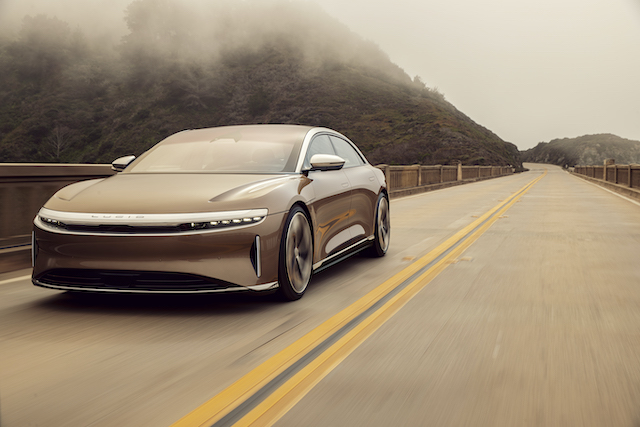
Lucid Air
Few cars of any type have garnered as much buzz as the Lucid Air. Why the hype? In September, the electric vehicle’s range was certified by the EPA as a record-breaking 520 miles. Range anxiety has long been one of the most significant hurdles in widespread EV adoption. The Lucid Air, and the technology behind it, could mark a significant milestone in emission-free driving. Add in its 0 to 60 mph in 2.5 seconds capability, 1,100 hp and uber-luxurious interior and you have one remarkable car.
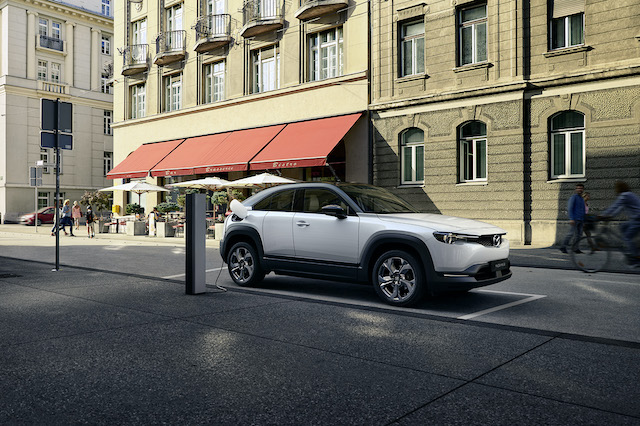
Mazda MX-30
Those shopping for an EV on a budget should take a hard look at the MX-30, which has a starting price below $35,000. If you’ve ever owned a Mazda before, you’re well aware of the carmaker’s ability to deliver more than the price tag suggests.
The MX-30 does have its downsides: At just 100 miles it has one of the shortest ranges in the EV market. To help offset this, Mazda offers customer 10 days of loaner Mazda vehicles each year to use for longer trips. MX-30 owners also receive a $500 EV charging credit to be used for public charging or the purchase of a ChargePoint home charger.
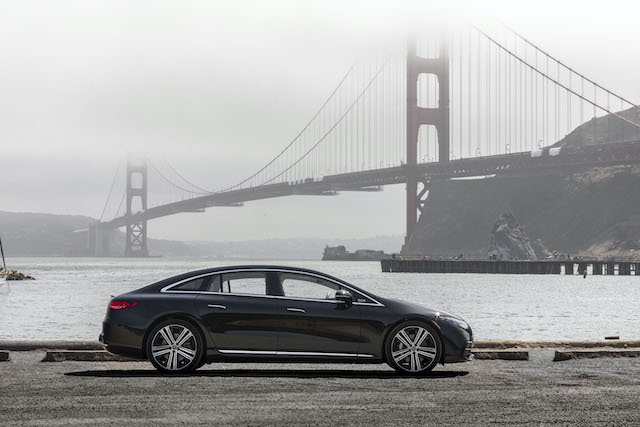
Mercedes-Benz EQS
The EQS will be the flagship electric sedan for the German automaker. The car’s aerodynamic design with sleek lines and rounded edges optimizes efficiency and helps deliver an estimated 470-mile range. Mercedes hopes the EQS can chip away at the large electric luxury sedan segment the Tesla Model S has dominated for so long.
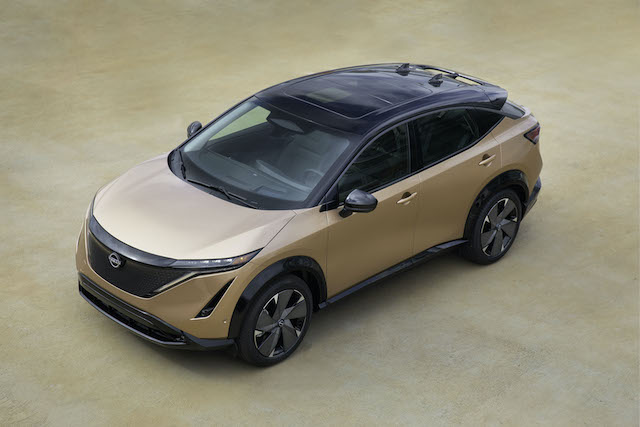
Nissan Ariya
Nissan, makers of the popular Leaf EV sedan, is adding a crossover to its electric vehicle lineup with the introduction of the Ariya. Available with front- and all-wheel drive, as well as standard and long ranges, drivers can customize their vehicle based on preferences and budget. Let’s not forget the Ariya’s state-of-the-art features, including a head-up display, built-in Amazon Echo and NASA-inspired Zero Gravity seats.
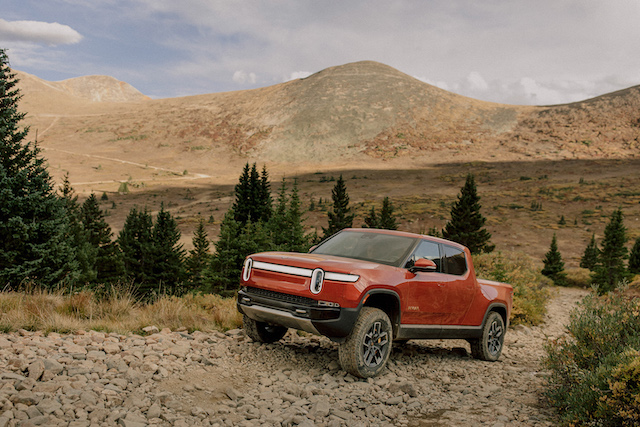
Rivian R1T & R1S
When the Rivian R1T rolled off the assembly line this fall, it became the first all-electric pickup truck available in North America. Not a bad first foray into the EV world for the upstart American company. Rivian plans to make the R1T the EV of choice for off-roaders. It boasts a towing capacity of up to 11,000 pounds, 14.9 inches of ground clearance, ability to drive through 3 feet of water and rock crawl at a 100% grade.
The R1T’s sister model, R1S, is an equally impressive electric SUV. It has many of the same stats as the Rivian pickup but with a larger, seven-seat cabin complete with an all-glass panoramic roof.
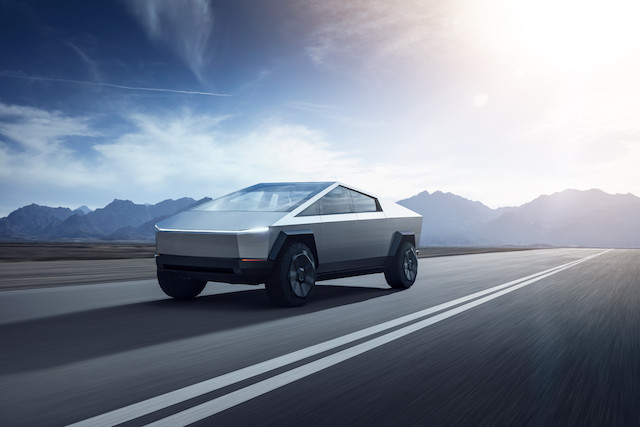
Tesla Cybertruck
To say the Cybertruck has been a polarizing figure in the automotive world would be an understatement – its futuristic appearance has garnered more than a few opinions. Still, if the vehicle delivers on its promise, it has a chance to revolutionize the EV market. According to the company, Tesla’s first truck will have the power of a pickup and the performance of a sports car.
Speaking of delivering on promises, the Cybertruck was originally slated to be on the road in 2021, so knowing the factory that will be used to manufacture the vehicle hasn’t even been completed puts some doubt into a 2022 debut. But, as of now, that’s the plan and you can already make your preorder.
Visit AAA’s Electric Vehicle platform for more information on these cars of the future.
Interested in purchasing one of these EVs? Or any other type of car? Let AAA help you finance your new or used vehicle purchase with a low-interest car loan.
12 Thoughts on “The 2022 Electric Vehicles to Get Excited About”
Leave A Comment
Comments are subject to moderation and may or may not be published at the editor’s discretion. Only comments that are relevant to the article and add value to the Your AAA community will be considered. Comments may be edited for clarity and length.



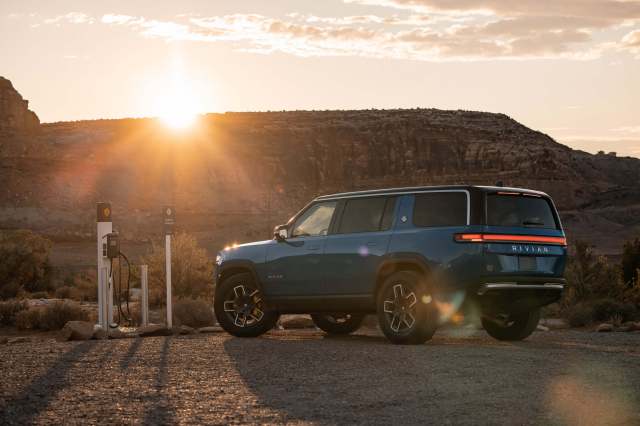












Electric cars are much more energy efficient that ICE (internal combustion engine) cars. Even if the electricity for them were to come from coal (which is usually not the case as coal is increasingly obsolete as an energy source in the US), they would still be much cleaner than ICE cars.
Electric cars are not cleaner than gas cars. Electric cars require dirty toxic mining for lithium and cobalt, and the electricity to charge them still comes from fossil fuels. So they burn coal instead of oil.
That’s wrong. There is no comparison. EVs are way way less polluting than constant gasoline emissions for years and years and years from EACH non-EV on the road. And soon cobalt will be eliminated from batteries entirely. Meanwhile ICE vehicles keep on burning and burning gasoline and oil.
What this article does not talk about is the cost and potential issues with installation of a charging system in you home or if you live in a rental or apartment building, the odds are you are out of luck. The charging systems require 240V and 40-60 amps and your current electric service may not be able to handle it. Also there is the cost of having a 220-240 volt service line plus the charging unit which is not an inexpensive addition cost. So before getting excited about an electric car, you need to be honest and point out all of the requirements
Hi David, thanks for the comment! You’re right — this article does just cover some of the upcoming electric vehicle releases. But we have plenty of articles that cover the topics you mention. In fact, we have a whole section of our website dedicated to EVs. You can find it here. Thanks for reading!
Try Splitvolt.com
Depending on the car you choose, you probably do not need a “charging station.” I have a 2019 Tesla Model 3. I had my electrician run a 220V line from my panel to the garage and install a NEMA 14-50 outlet in the garage. (NEMA 14-50 is the same outlet that electric ranges and dryers use.) Cost, a couple of hundred (including permit).
Exactly! Same here! I went to a Supercharger very close to my house, once to see what it was about. My MY charges in my garage and anyone who has a garage will be charging there. The one-time installation fee by an electrician is just not that expensive. And talk about ludicrous, this article has the self-igniting at the top of their list. Clever that they omitted the best selling EVs in the world.
Great idea easily done should be part of a new national building code.
Thanks JohnB
For those who can’t install a 240V charger (which is fairly inexpensive) EVs can be charged on regular household current, albeit slowly. 120V (household) current will get you charged enough overnight for a short commute or an occasional longer trip.
Charging on 115v using the charger that comes with the EV is not practical unless your usage is minimal. The rule of thumb: If you can put the miles you use during the day back into the EV overnight, charging is worry free, no hassle. Plug in in the evening, use a all day, do not need to give it a second thought. But with just the included “granny” charger, you have to plan your useage and charge time, and it is a headache. I did that for the first couple of months before I installed my 240V charger, and it was not fun.
The dirty little secret about EV-s is how much range you may lose on a cold winter day. You need to have a margin planned in the battery capacity you think you need and in the planned charging times to cover this. When it is very cold, you may lose as much as 30% range to cabin heating and battery inefficiency.
I have installed a charger myself in my garage. The distance from the panel matters, mine was 30 feet. Amperage needed matters, I needed a 50 amp breaker. If you need a new, bigger fuse box
the cost goes way up, I did not.
My total cost was about $1300. (800 for a Chargepoint charger, plus AWG 6 line, plus new circuit breaker, plus conduit, plus permit). I got quotes from electricians for just my install, labor and materials 1000-2000.
If you are renting your apartment, installing a charger could be problematic, and you have to figure out a workable charging strategy, otherwise an electric vehicle could be more of a hassle than it is worth.